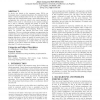Free Online Productivity Tools
i2Speak
i2Symbol
i2OCR
iTex2Img
iWeb2Print
iWeb2Shot
i2Type
iPdf2Split
iPdf2Merge
i2Bopomofo
i2Arabic
i2Style
i2Image
i2PDF
iLatex2Rtf
Sci2ools
140
click to vote
DAC
2010
ACM
2010
ACM
LUT-based FPGA technology mapping for reliability
As device size shrinks to the nanometer range, FPGAs are increasingly prone to manufacturing defects. We anticipate that the ability to tolerate multiple defects will be very important at 45nm and beyond. One common defect point is in the lookup table (LUT) configuration bits, which are crucial to the correct operation of FPGAs. In this work we will present an error analysis technique that is able to efficiently calculate the number of critical bits needed to implement each LUT. We will perform this analysis using a scalable overlapping window-based method called DCOW (Don't-care Computation with Overlapping Windows), which allows for accurate and efficient don’t-care lower bound calculations. This new windowing technique can approximate the complete don’t cares within 2.34%, and can be used for many logic synthesis operations. In particular, we apply DCOW to our FPGA mapping algorithm to reduce the number of possible faults. This will allow the design to have a much higher s...
Related Content
| Added | 15 Aug 2010 |
| Updated | 15 Aug 2010 |
| Type | Conference |
| Year | 2010 |
| Where | DAC |
| Authors | Jason Cong, Kirill Minkovich |
Comments (0)

